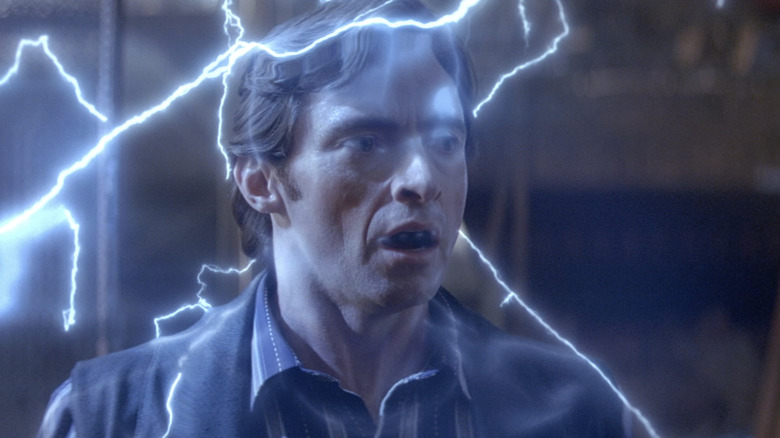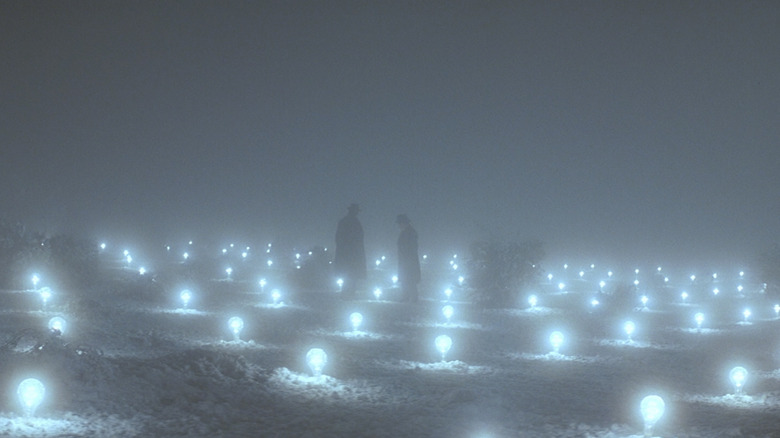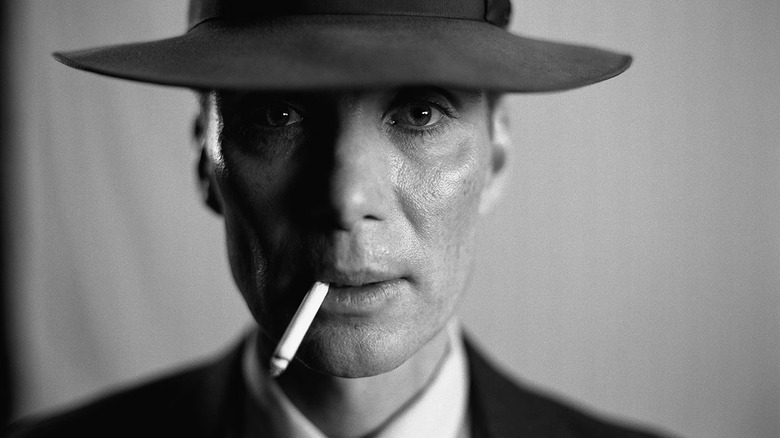Christopher Nolan Originally Had Much Humbler Plans For The Prestige
When filmmakers reach a certain stature in Hollywood, many find it difficult to go backward. They have become accustomed to a certain scale and scope that it becomes rather second nature. Even when these people came up scraping together a few dollars wherever they could to make their first films, the comfort the bigger budget gives them alters how they approach their moviemaking. It's like the old adage about toothpaste. Once it's out, you can't put it back in the tube (unless you're Steven Soderbergh).
Take Christopher Nolan, one of the few directors who can seemingly get any budget he wants for any idea that pops into his head. In the franchise and IP-driven Hollywood cinematic landscape, this is luxury almost no one else is afforded. But he, of course, didn't start out his career making $100 million dollar movies on the regular. In fact, his first film, "Following," was made for a reported $6,000. Even Martin Scorsese was able to scrounge together $70,000 for his directorial debut, and that was back in the 1960s. Every Nolan film after saw a steady budget increase until he was making a full-on summer blockbuster in "Batman Begins," which cost $150 million.
Nolan attempted not to have the enormous scale be his modus operandi. He had gone and made his gigantic picture, and now it was time to go back to the smaller world he had spent so much time in. That was what he wanted to do, anyway. When it came time to make his next film, the magician thriller "The Prestige," he could try all he wanted, but the scale of a massive tentpole had already become ingrained in his style.
Misjudging the grandeur
While "The Prestige" was made for only $40 million, it feels like a much more massive production. It is a story that takes place on multiple continents, across several timelines, and features an immense amount of period-specific design work. Oh, yeah, and there's a gigantic electric cloning machine. Christopher Nolan's intention, however, was for it not to have that grand sweep. In speaking with Empire, he explained how he consciously was trying to strip away the grandeur:
"I mean, for example, we didn't build any sets, we shot it all on location. And there are scenes we didn't even light, and everything's predominantly shot with a handheld camera. We didn't give the actors marks, we had to follow them. We tried to be much looser and more spontaneous than we were able to be on 'Batman Begins,' which was a very precisely made action movie."
It's interesting that he felt a handheld camera would be a good solution to this. "Batman Begins" is filled with a lot of handheld, disorienting camerawork, particularly in the action scenes. To us, this is just a part of Nolan's style as a whole, making it feel comparable in scale to the superhero movie. He also worked with cinematographer Wally Pfister on all these films, and his natural style is to make things feel bigger and more beautiful than they actually are. While he may not have achieved the trimming down he wanted, Nolan still made one of his best films and one everyone involved ended up being happy with. As he said:
"I thought I was making some obscure little art film or something, and we showed it to the studio and they see it as a very mainstream film — which, if that's the case, is delightful."
Now, he doesn't even try to scale down
I think once Christopher Nolan realized "The Prestige" was far from the little movie he thought he was making, he just decided to throw away any pretense that he was not completely interested in making gigantic movies. Every movie he has made since has cost at least $100 million. He continues to shoot more and more footage with the prohibitively more expensive 70mm IMAX cameras. His casts are usually filled with wall-to-wall big-name actors. He works predominantly in the action and science fiction genres, which require vast amounts of visual effects work that he insists must be done mostly practically. The days of making a little movie are over.
His next film is "Oppenheimer," which is a biographical period drama. It has a budget of $100 million. We live in a time where films not based on famous intellectual property struggle to make a big splash in cinemas, and Nolan is a rare case where his name being on a movie is enough to get people to the theater. I think he feels a responsibility to deliver something on a massive scale the audiences can't get anywhere else so they keep showing up. However wrongheaded the push to put "Tenet" in theaters during the first summer of the pandemic was, the impulse came from the same place that gives us these gigantic movies. And if you did see "Tenet" in a theater, you understand why it needed the big canvas.
Do I want to see what Christopher Nolan could do with a $5 million budget today? Absolutely. But as long as he is able to command these hefty budgets for movies that aren't just mining what a studio holds the rights to, I will continue to support him.


